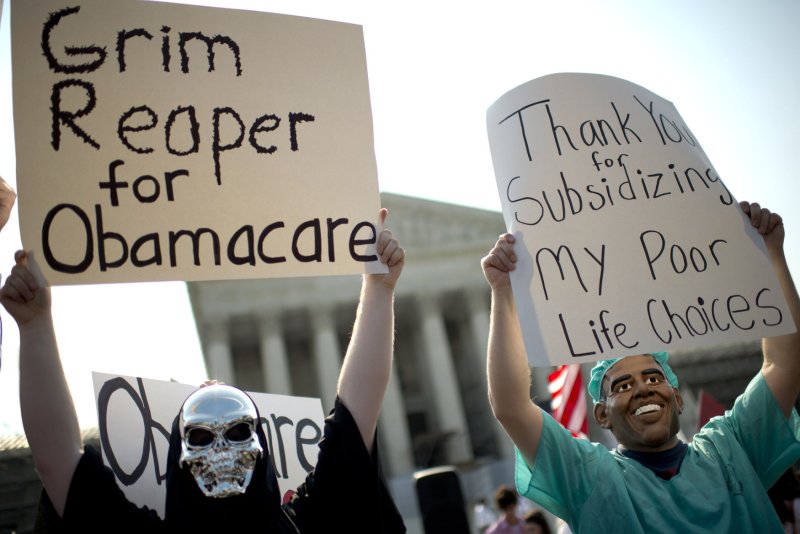Activists opposed to the Affordable Care Act demonstrate in front of the U.S. Supreme Court in Washington, D.C. File Photo by Kevin Dietsch/UPI |
License Photo
Dec. 10 (UPI) -- The Supreme Court appeared divided Tuesday on whether to require the federal government to pay private health insurers $12 billion in lost revenue for selling plans under the Affordable Care Act to people who otherwise would not have qualified.
The case stems from a statute in the 2010 healthcare law known as the "risk-corridors program" that required the government to partially reimburse insurers if costs rose unexpectedly due to insuring new customers -- while in turn requiring insurance companies to return any potential savings on a three-year cycle.
Insurers paid back $480 million in savings during the first cycle, but from 2014 to 2016, the government only partly reimbursed insurers who lost money by selling plans to people who wouldn't have previously qualified, the suit says.
The government pledged to make up the difference in future payments, but Congress failed to appropriate enough funds to do so.
Attorney Paul Clement, who represented three small insurance companies, told the Supreme Court the risk-corridors program was "a massive government bait and switch."
"Congress made a clear money-mandating promise to pay," he said. "When it became time to pay, the government pointed to appropriations riders."
Justice Elena Kagan agreed, saying she didn't understand why the insurance companies were required to pay the government their savings, but the government didn't have to fulfill its end of the bargain.
"So this is one where the 'shall pay in' is obligatory but the 'shall pay out' on the part of the government is not obligatory?" she asked. "What kind of statute is that?"
Chief Justice John Roberts, though, appeared to be in favor of the government's side of the case, asking why the insurance companies didn't ask Congress for language that would ensure they get paid.
"You make a case at some length about the reliance of the insurance companies, they were basically seduced into this program," he said.
"But they have good lawyers and the Constitution says no money shall come out of the Treasury except pursuant to an appropriations clause. I would have thought at some point they would have sat down and said, 'Well, why don't we insist upon an appropriations provision before we put ourselves on the hook for $12 billion?'"
Justice Brett Kavanaugh appeared torn on the matter.
"If we were to rule for you, everyone will be on notice going forward, private parties and Congress itself, that 'shall pay' doesn't obligate actual payments," he said. "If we rule against you, Congress also will be on notice going forward that it intends to include 'subject to appropriations' kind of language in any mandatory statute."
The District of Columbia U.S. Circuit Court of Appeals earlier ruled in favor of the government, saying Congress implied a repeal of the risk-corridors problem through appropriations riders and the insurers are not entitled to any payments, as statutes are subject to change and should not be considered agreements.
"The ACA reserved to future Congresses the determinations whether and to what extent to fund the risk-corridors program," U.S. Solicitor General Noel Francisco wrote in his brief to the Supreme Court.
In their appeal, the insurers said the statute implies a contract on which the government cannot renege simply by failing to appropriate necessary funds.
The Supreme Court will determine whether the appropriations riders implied a repeal of the program.
Additionally, justices must rule on whether the government owes the insurance companies the $12 billion, regardless of whether the program was repealed.
Some experts fear if the Supreme Court rules against the insurers, it might set a dangerous precedent that frees the government from accountability with future statutes.
"The government undermines its ability to use financial incentives to achieve policy objectives by, after the fact, not paying the amounts it promised," states an amicus brief filed by a group of economists.















